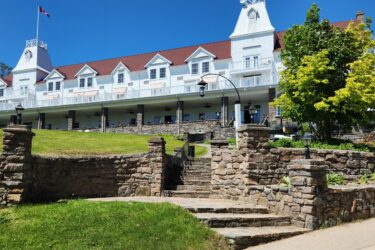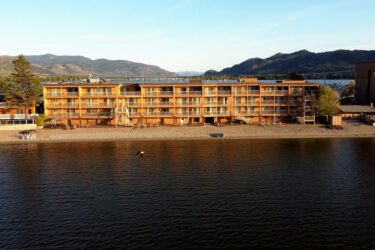
InnVest Hotels acquires The Algonquin Resort St. Andrews by‑the‑Sea, Autograph Collection and The Algonquin Golf Course
InnVest Hotels has acquired The Algonquin Resort St. Andrews by-the-Sea, Autograph Collection and The Algonquin Golf Course.
VANCOUVER — Greg Klassen worked as senior VP marketing strategy and communications at CTC (the predecessor to Destination Canada) during SARS. Here are his thoughts on what Canada can learn from our experiences in 2003.

VANCOUVER — Greg Klassen worked as senior VP marketing strategy and communications for the CTC (the predecessor to Destination Canada) during the SARS crisis. Today, he is a partner in Twenty31 Consulting, which works with leaders of organizations to define their unique tourism opportunities. Here are his thoughts on what Canada can learn from our experiences in 2003.
In March 2003, when SARS hit the news, Klassen was working at CTC as head of the U.S. market, the U.S. being indisputably Canada's largest source of tourists. “When people got the a sense of the impact of SARS, I took over the SARS file, looking at its potential impact and trying to mitigate and salvage its effects on tourism,” Klassen told CLN.
One difference in SARS and COVID-19 (coronavirus) is that because SARS was perceived as centric to Toronto, many target markets were not considering Canadian destinations. “Because it was centred here, it had much more potential impact on foreign travel to Canada,” Klassen said.
“It became a Canadian problem, not just a Toronto problem. I heard one story about New Yorkers cancelling an event in Edmonton due to SARS, even though Edmonton was much farther away from the epicentre [Toronto] than New York.”
On the other hand, the profound growth of the Chinese market both globally and in Canada means that it has a much more powerful financial impact. UNWTO figures show that China is now the most important market for Australia and Japan and in the top five for Canada and Thailand. And the trend continues: Chinese visitors to the GCC region [Gulf Cooperation Council, a union of Arab states bordering the Gulf], for example, are projected to rise from 1.6 million to 2.9 million – an 81 per cent increase – between 2018 and 2022. Overall, China is now clearly the biggest, and highest-spending outbound travel market worldwide, with nearly 150 million outbound visits made by Chinese travellers in 2018, who spent $US277.3 billion.
“Since 2003, Chinese travel to Canada has grown seven-fold,” Klassen explained. “It is now Canada's third largest international market. When the Chinese tourist stops travelling, it has an impact on Canada.” Districts such as B.C., Banff-Jasper, Toronto, Niagara, Ottawa and the Montreal area will feel more of an impact, as will hotel chains and attractions with a higher yield, such as the iconic Fairmonts and other high-end properties. But the lower-yield and budget properties will be affected too. “If those hotels are part of the package, there will be an impact,” Klassen said.
At its peak in 2018, there were 700,000 Chinese visitors to Canada. The number went down in 2019 due to geopolitical issues.
“I've done some research, talking to colleagues in B.C., Alberta and Ontario, and right now, they're not seeing a large drop in visitors, they're not seeing mass cancellations because this is low season for the Chinese. But international markets, such as Thailand and Japan, have seen 40 to 50 per cent drops. In Bali, where Chinese visitors account for one third of the total, visitation is down by 40 per cent.” This is largely due to a social media campaign saying that Bali would not be able to manage an outbreak, even though there are no cases of COVID-19.
“During SARS, we started to do a fair bit of market research to find out which countries were avoiding Canada. We wanted to determine our new target markets, to find out what kind of travellers would look and understand that SARS was not happening in Vancouver. We held focus groups in the U.S. and did quantitative surveys to find out where we should be marketing and what type of visitors would come. We looked at the potential to stimulate visitation during the crucial summer months.”
They found that some U.S. travellers were okay with travel to Canada, and the the European market was quite resilient. “We got stimulus from the government to help us recuperate our major losses.”
Klassen stresses that leadership in tackling this issue is crucial. “We took leadership at the CTC, working with all of the provinces and local DMOs. We wanted to have a common message, with no rogue media messages, acknowledging the significant health risk. We wanted to demonstrate that actions were being taken, and that we were hoping to partner with industry to repurpose marketing money. We even worked with some of the hotel chains at the time, as they were more localized to Canada and chains were more a part of local communities in 2003.”
Canada can learn from destinations in Asia and the Middle East where there are massive cancellations out of China since it's their high season. For example, the Singapore government provided massive stimulus for tourism, even subsidizing wages and conducting marketing campaigns. Hong Kong has felt the biggest impact of COVID-19, as it is closer to the epicentre and for the last 15 years has built its tourism industry on mainland Chinese tourism. The Hong Kong tourism board is looking at a wholesale rebranding of their destination, trying to recover.
It's important to note that it's not just a Chinese problem. Forward bookings out of Asia Pacific, not including China, are down 11 per cent. There's a ripple effect on markets such as Korea, Japan and South Asia. Japan and Korea are also among the top 10 markets for Canada.
Klassen also theorized that countries such as Thailand, Bali and Japan are dropping their prices in response to the crisis. “This may be the year [for travellers] to take the trip of a lifetime as there will be a significant price drop. This substitution effect may attract other core markets such as Europe and the U.S. Canadians are hopeful that it won't impact them, but I can't see how that would happen.”
Planning and strategy, with national, provincial and local organizations and tour operators working together, are key to mitigating the effect of COVID-19 on travel to Canada. Canada should be working on what to do if mass cancellations occur and we need to ramp up our efforts. “There are opportunities to mitigate the downside by getting involved with markets like Mexico, the U.K., Germany and even Australia.” These organizations should be looking at targets and doubling up their investment targeting alternative markets.
The hotel industry should also be thinking about what their tolerance will be in terms of dropping their rates, and look at other non-rate-dropping ways to stimulate visitors and travel. “They could offer the fifth night free, or use other incentives to visitors,” Klassen said. “With SARS, it took a decade to recover [rate]. This [crisis] will recover, not nearly as slowly as the previous challenge. But there should be a solid strategy and plans in place to mitigate this challenge and manage risk.
“There should be concentrated, solid, evidence-based planning. Tourism is an ecosystem and hotels should be working with DMOs, the provinces and the national associations to manage the downside of this challenge.”



InnVest Hotels has acquired The Algonquin Resort St. Andrews by-the-Sea, Autograph Collection and The Algonquin Golf Course.

The new owners of the famed Windermere House hotel and resort on Muskoka’s Lake Rosseau intend to revitalize the building and its amenities while preserving the property’s historical integrity.

Proactive Hospitality has acquired the Coast Osoyoos Beach Hotel, B.C. CFO Capital arranged acquisition financing for the deal.

Tribute Portfolio – part of Marriott Bonvoy's extraordinary portfolio of 31 hotel brands – continues to grow its global family of characterful hotels with Honeyrose Hotel Montreal, a Tribute Portfolio Hotel, the brand's…